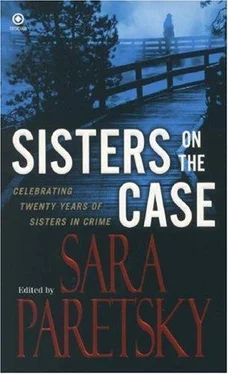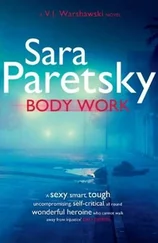Kevin looked down.
‘‘Get back, you little creep!’’ Bernie moved to Kevin’s side and hoisted his club.
The boy stood his ground. ‘‘You know you don’t belong with’’-he waved a hand-‘‘him.’’
A commander in a white shirt at the edge of the barricade yelled through a megaphone, ‘‘Clear the streets. Do you hear me, men? Clear the streets. Now!’’
Someone else shouted, ‘‘All right. Grab your gear. Let’s go!’’
A line of police pressed forward, but the boy and girl remained where they were. Everything fell away except the sound of the boy’s voice. In an odd way it felt as silent as the cemetery behind the church.
‘‘Time’s running out, man,’’ the boy said, his hand half covering his mouth. ‘‘How can you defend the law when you know it’s wrong?’’
Bernie’s voice slammed into them like a hard fist. ‘‘Kev, don’t let him talk to you like that.’’
Kevin spun around. Bernie’s face was purple with rage. Brandishing his riot stick, he swung it down at the boy’s head. The boy jumped, but the club dealt a glancing blow to his temple. The boy collapsed.
‘‘Bernie, no!’’ Kevin seized Bernie’s arm.
Bernie snatched his arm away. ‘‘Do your job, Dougherty.’’ He pointed to the kids with his club. ‘‘They are the enemy!’’
The girl turned to Kevin with a desperate cry. ‘‘Make him stop!’’
Kevin strained to see her face in the semidark. ‘‘Go. Now. Get lost!’’
‘‘No! Help me get him up!’’ She knelt beside the boy.
‘‘What are you waiting for, Dougherty?’’ Bernie’s voice shot out, raw and brutal. He clubbed the boy again. The boy lay curled on his side on the ground, moaning. Blood gushed from his head. His glasses were smashed.
‘‘Do something!’’ the girl screamed at Kevin. ‘‘Please!’’
Her anguish seemed to throw Bernie into a frenzy. His eyes were slits of fury. He raised his stick over his head.
Kevin froze. Everything slowed down. Images of Maggie floated through his mind. She could be in the crowd. Maybe Father Connor. Even his mother. He thought about Mike. And his father. What Bernie was doing. What his duty was. His duty was to serve and protect.
The moment of clarity came so sharply it hurt. His chest tightened, and his hands clenched into fists. For the first time-maybe in his entire twenty-three years-he knew what that duty meant.
‘‘Dougherty.’’ Bernie kept at him, his voice raspy. ‘‘Either you do it, or I will!’’
Kevin stared at his partner. Then he dropped his club and threw himself over the girl. She groaned as his weight knocked the wind out of her. Her body folded up beneath him, but it didn’t matter: she was safe. Kevin twisted around and caught a glimpse of Bernie. His riot stick was still raised high above his head.
Kevin wondered what his partner would do now. He hoped the whole world was watching.
I Killed by Nancy Pickard
When the second man sat down, the green metal park bench groaned and sank into the dirt. He took the left side, leaving a polite foot and a half between his arthritic, spreading hips and the wide hips of the man leaning on the armrest on the other side of the bench.
They glanced at each other. Nodded heavily, like two old bulls acknowledging one another’s right to be there. Then they turned their beefy faces back to the view. Each man inhaled deeply, as if his worn-out senses could still detect the burnt-grass, baked-dirt scent of autumn.
They both wore baggy gym suits that looked as if nobody had ever run in them.
Behind them stretched an expanse of golden grass, and then the elegance of Fifty-fifth Street. On the opposite side of Fifty-fifth, the big windows of large, well-maintained houses looked out over the same beautiful vista the two men faced. In front of them, there was a cement path, then trees, then the golden-green, rolling acreage of Jacob L. Loose Park. If they’d hoisted their aching bodies up, and limped to the right, they’d have come to a pond where swans paddled in bad-tempered glory all summer, but which Canada geese owned now that it was late November. If they’d hobbled left, instead, they’d have come to tennis courts, wading pool, rose garden, playground. Mansions and high-rise, high-priced condos ringed the big park in the middle of Kansas City, Missouri. To the north was a private school, then the Country Club Plaza shopping center; to the south were the neighborhoods of Brookside, Waldo, and a short drive to the suburbs.
It was a tranquil, wealthy, civilized scene in the heart of the city.
The man on the right side of the bench said, in a voice made gravelly from time and the cigars he no longer smoked, ‘‘You come here often?’’
After a long moment, as if he hadn’t much liked being spoken to and was considering ignoring it, the second man said, ‘‘No.’’
His voice sounded as if he, too, had been a heavy smoker in his day.
‘‘I do.’’ The first man coughed, deep, racking, phlegmy. ‘‘I come here every day.’’ When he was finished hacking, he said, without apologizing for the spasm, ‘‘This bench, every afternoon, regular as clockwork.’’
‘‘That right.’’ His bench companion looked away, sounding bored.
‘‘Yes, it is. You know the history of this park?’’
‘‘History?’’ Now the second man looked where the first man was pointing him, with a finger that looked like a fat, manicured sausage. He saw a black cannon, a pyramid of cannonballs, and what looked like a semicircle of signs for tourists. ‘‘No, I don’t know it.’’
And don’t care to, his tone implied.
‘‘This was the scene of the last big Missouri battle in the Civil War. October twenty-third, 1864. The Feds had chased the Rebs all across the state from Saint Louis, but the Rebs kept getting away. Finally, they took a stand here. Right here, in this spot. Picture it. It was cold, not like today. They were tired, hungry. There was a Confederate general right here, where that big old tree is. It’s still called the General’s Tree. His graycoats were standing here, cannons facing across the green. Then the bluecoats suddenly came charging up over that rise, horses on the run, sabers glinting, guns blazing.’’
He paused, but there was no response.
‘‘Thirty thousand men in the battle that day.’’
Again, he paused, and again there was no response.
‘‘There was a mass grave dug afterwards, only a few blocks west of here.’’
Finally, the second man said, ‘‘That right?’’
A corner of the historian’s mouth quirked up. ‘‘Mass graves always get people’s attention. Saddam would still be alive without ’em. You just can’t kill too many people without somebody noticing.’’
‘‘Who won?’’
‘‘Feds, of course. Battle of Westport.’’ Abruptly, he changed the subject. ‘‘So what’d you do?’’
‘‘What did I do ?’’
The question rumbled out like thunder from a kettledrum.
‘‘Yeah. Before you got here to this park bench. I’m assuming you’re retired. You look around my age. You’ll pardon my saying so, but we both got that look of being twenty years older than maybe we are. And not to mention, you’re sitting here in the middle of a weekday afternoon, like me.’’
‘‘Almost.’’
‘‘Almost what? My age, or retired?’’
‘‘Both, probably.’’
‘‘I figured. You always think so long before you speak?’’
There was a moment’s silence which seemed to confirm it, and then, ‘‘Sometimes.’’
‘‘Well, retire quick, is my advice. I was a salesman.’’
The other man finally looked over at him, but skeptically. A slight breeze picked up a few strands of his thin hair, dyed black, and waved it around like insect antennae before releasing it to fall back onto his pale skull again.
Читать дальше












